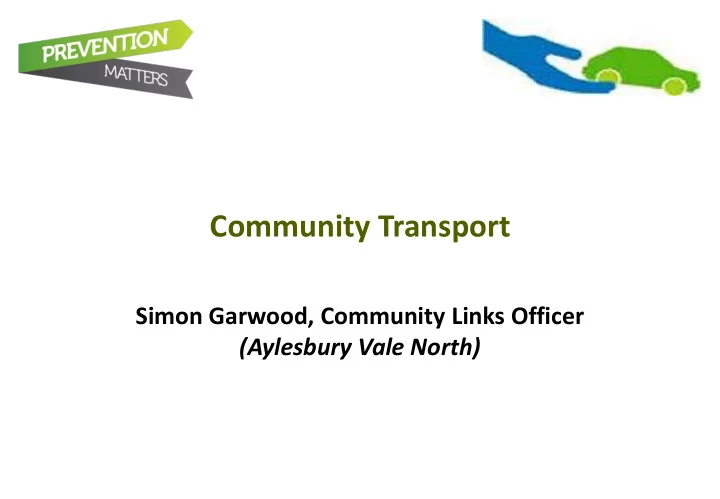

Community Transport Simon Garwood, Community Links Officer (Aylesbury Vale North)
Types of Community Transport: • Voluntary Car Schemes • Community Buses • Dial-a-Ride • Taxi Schemes
Voluntary Car Schemes: • General Car Schemes • Hospital Car Schemes • Doctors Car Schemes • Good Neighbour Schemes
Community Buses: • Buses for Hire • Public Bus Routes • Door to Door Services
Taxi Schemes: • Shared Taxis • Bus routes • Taxi Tokens • Fair4all
Community Transport Hub
Community Transport: Strengths and weaknesses Voluntary Car Schemes Strengths Challenges Cheap to set up and run, Personal, Not run by Professionals, dependant Flexible and Adaptable, Can provide on goodwill and volunteers, Need extra support e.g. shopping, hospital advanced notice and booking. appointments etc. Vehicles may not be accessible.
Community Transport: Strengths and weaknesses Community Buses Strengths Challenges No need to book, cheaper for clients Less flexible – fixed times and routes. – bus passes can be used, Timetables Expensive to set up and maintain. and routes can be published. Social experience of travelling with others.
Community Transport: Strengths and weaknesses Dial-a-Ride type schemes Strengths Challenges Door to door service, bookable Membership required – criteria for journeys, accessible vehicles, trained users. Can be expensive to run in drivers, good reputation. rural areas. Vehicle maintenance costs.
Community Transport: Strengths and weaknesses Taxi schemes Strengths Challenges Reliable, door to door, may be Expensive for longer journeys, User accessible vehicles available, cheaper confidence (lack of), Training for than supplying buses on under used drivers, Need to book in advance routes
Development and Sustainability Challenges: Voluntary Car Schemes: • Set up – Finding the right person / group to drive the project forward • Accessible vehicles and training for volunteers (informal vs formal) • Policies, insurance, legal issues, best practice, DBS checks • Recruiting reliable coordinators, more than 1 to ensure sustainability • Defining parameters – types of journeys, catchment area • Ensuring financial sustainability – drivers not compromised • Recruiting and retaining drivers – communicating regularly with volunteers so they feel supported.
Development and Sustainability Challenges: Community Buses: • Funding (Set up and Depreciation) – capital costs and running costs • Cost of repairs and coping when bus is off the road • Marketing and promotion • Changes to routes • Maintaining pool of volunteer drivers (Driver training) • Policies, insurance, legal issues, best practice, DBS checks • No formal training / support for trustees and coordinators
Questions?
Recommend
More recommend